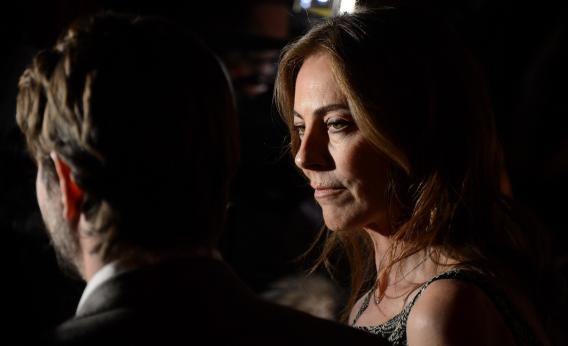My colleague Dana Stevens has already identified one of the biggest surprises of this morning’s Oscar nominations: no Best Director nod for Kathryn Bigelow. Good directors, good performances, and good movies get shut out of this every awards ceremony and every year, and Bigelow already has a Best Director statuette for The Hurt Locker. But I can’t help wonder if she’s been snubbed because of a political debate that has made her movie, a major artistic achievement, impossible to see clearly.
I’ve argued at length that Zero Dark Thirty, while certainly failing some stringent political litmus tests on the use of torture, is actually about a much broader question—has the war on terror been worthwhile?—and presents a much more radical answer than many of the political commentators who’ve been critiquing the movie from the left give it credit for. Bigelow hasn’t helped herself or her movie with the interviews she’s given about the process she used to research the movie or her insistence that the film isn’t intended to take sides. But in refusing to provide a definitive key for how to read Zero Dark Thirty, she’s done something that would be entirely reasonable for most directors, including Steven Spielberg, who got a nod for Lincoln, to do: left space for audiences to actually see the thing and make their own conclusions. (Notably Quentin Tarantino, whose Django Unchained has faced protests of its own, though not nearly at the level that Bigelow and her screenwriter Mark Boal have, also wasn’t nominated.)
Regardless of your party affiliation, watching Zero Dark Thirty with a political checklist in hand can make it very difficult to see Bigelow’s other accomplishments in the movie and to think about how her choices affect her political arguments. Though many of the events depicted in the film are morally and physically ugly, Zero Dark Thirty is a strikingly beautiful movie and makes use of the golden light at a base in Afghanistan or the maroon webbing inside a military plane to frame forceful moral and emotional moments. These are the types of things directors are honored for. While Jessica Chastain got, as expected, a Best Actress nomination, the focus on her character has overshadowed the power of the other performances in the movie, from Jason Clarke’s turn as a cheerful torturer who is changed by his work, to Jennifer Ehle as a CIA agent who believes that appeals to human decency (and a healthy dose of bribery) can work better than harsh interrogations. Getting great performances out of your actors is yet another accomplishment that directors are often honored for.
Maybe those honors will come in a win for Chastain or for screenwriter Mark Boal or for Zero Dark Thirty for Best Picture. But it’s still a shame to see Bigelow not get recognized for her work in getting them those nominations.
